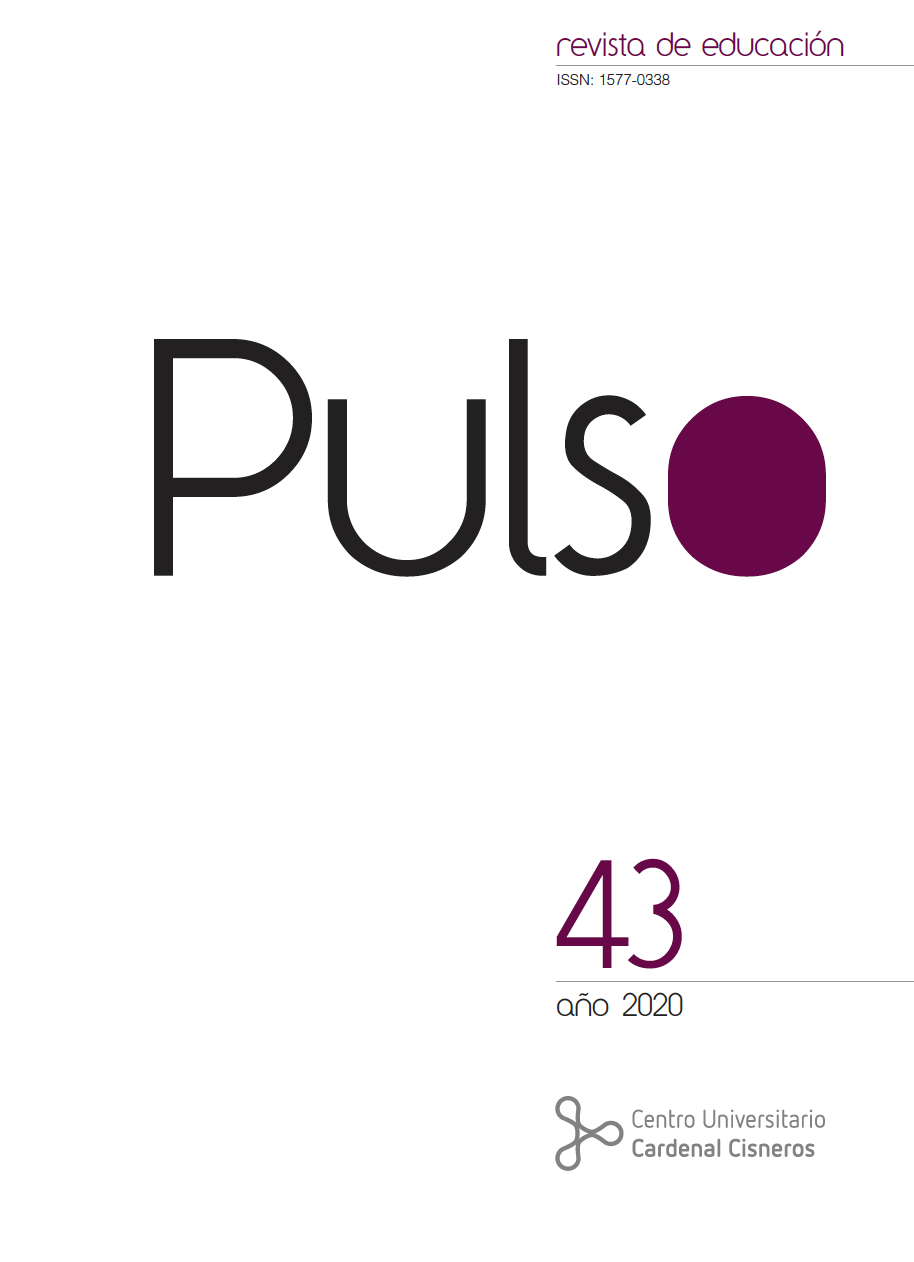Learning the language of the media through a didactic project based on the inverted class in the university context
DOI:
https://doi.org/10.58265/pulso.5201Keywords:
Spanish Language, Media, Flipped classroom, Audiovisual TechniqueAbstract
This paper describes the development of a didactic experience undertaken in a second grade group in the Translation and Interpreting degree at Rey Juan Carlos University. The project was aimed at helping students to learn the specific characteristics of mass media language. This project has been carried out through an inverted, cooperative class methodology supported by audiovisual elements. Highly satisfactory results were obtained since, as explained throughout the paper, students’ learning results were considerably improved compared to those of the previous year. The qualitative and quantitative comparison of the learning results has been possible due to the fact that we worked with this group the previous year. The obtained results lead to an overall highly remarkable satisfaction level with the project. We consider that dissemination of this proposal is of great use because it has shown great pedagogical validity for the sample group. In the same way, it is very useful since, with the corresponding content adaptations, it can be applied in different levels of the Spanish Language classroom.
Downloads
References
Andrade, E. y Chacón, E. (2018). Implicaciones teóricas y procedimentales de la clase invertida. Pulso. Revista de Educación, 41, 251-257.
Clausell, P. (2019). La enseñanza-aprendizaje de locuciones idiomáticas a través de la técnica de flipped classroom en el aula de español como lengua extranjera. Quaderns digitals. Revista de nuevas Tecnologías y Sociedad, 89, 91-112.
Cervantes Caballero, A. (2018). Metodología de clase invertida ¿Realidad o ficción? En Monteagudo-Fernández, J., Escribano Miralles, A. y Gómez-Carrasco, C. (Eds.), Educación histórica y competencias transversales: narrativas, TIC y competencia lingüística, (pp. 255-262). Murcia: Editum.
Moya Fuentes, Mª M. y Soler García, C. (2019). La clase invertida o “Flipped classroom” en la enseñanza de materias jurídicas. En Roig-Vila, R. (Ed.), Investigación e innovación en la Enseñanza Superior. Nuevos contextos, nuevas ideas, (pp.1226-1235). Barcelona: Octaedro.
Peinado Rocamora, P. (2018). La clase invertida: una experiencia con alumnos con dificultades de aprendizaje. Mª Paz Prendes Espinosa y Mª Mar Sánchez Vera (dirs.). Tesis doctoral. Murcia. Universidad.
Peinado Rocamora, P., Prendes Espinosa, Mª P. y Sánchez Vera, Mª M. (2019). La clase invertida. Revisión sistemática en el periodo 2000-2017. Docencia e Investigación, 30, 96-120.
Ponce, S., Marichal, A., Martínez, G., Soldini, M. y Ponce, R.D. (2017). Implementación de la clase invertida en el aula universitaria: posibilidades para la obtención de aprendizajes no superficiales. Te&Et. Revista Iberoamericana de Tecnología en Educación y Educación en Tecnología, 19, 159-168.
Sánchez Cruzado, C. (2017). Flipped classroom. La clase invertida, una realidad en la Facultad de Ciencias de la Educación de la Universidad de Málaga, Ruíz Palomero, J. y Sánchez Rodríguez, J. (dirs.). Tesis doctoral. Málaga. Universidad.
Tallei, J. (2017). Clases invertidas en el aprendizaje de lenguas adicionales ¿Nuevos conceptos? Caracol, 13, 208-222.
Tourón, J. y Martín, D. (2019). Aprender y enseñar en la universidad hoy. Una guía práctica para profesores. Logroño (La Rioja). UNIR.
Tsukada, M. (2018). Implementación del modelo Flipped Classroom en la enseñanza del idioma japonés como lengua extranjera a alumnos españoles. Edunovatic. 2018. III Virtual International Conference on Education, Innovation and ICT. (p.230). REDINE. (Red de Investigación e innovación educativa).
Yeste, Mª del P. y Sales, D. (2016). Una experiencia de clase invertida aplicada. En Edunovatic. 2016. I Congreso Virtual Internacional de Educación, Innovación y TIC. (pp. 254-257). REDINE. (Red de Investigación e innovación educativa).
Downloads
Published
How to Cite
Issue
Section
License
Copyright (c) 2022 Pulso. Revista de educación

This work is licensed under a Creative Commons Attribution-NonCommercial-NoDerivatives 3.0 Unported License.
This journal offers immediate open access to its content based on the idea that offering readers free access to research favours a global exchange of knowledge.
Papers are published in the electronic version of the journal under a Creative Commons License: Attribution-NonCommercial-No derivatives 4.0 International
Authors are allowed and encouraged to promote the post-print version (reviewed and accepted for publication version) of their work online before publishing them. This favours their earlier circulation and dissemination and thus a possible increase in their citation and reach among the academic community.














